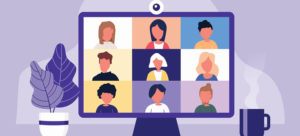Seniors at Mount St. Mary’s University in Emmitsburg had just attended a career fair when the campus shut down.
Students at St. Frances Academy in Baltimore were struggling not only with schoolwork, but the grief of losing family and friends.
And at Villa Maria Dundalk, an outpatient mental health clinic operated by Catholic Charities of Baltimore, the counseling of children whose anxiety makes it difficult to attend school took a twist.
The coronavirus pandemic shut down most counseling sessions, where body language and non-verbal cues help gauge the well-being of students and clients. Zoom sessions have become the norm, along with email blasts, virtual office hours and old-fashioned phone calls. At Mount St. Mary’s, the focus for seniors shifted from “dream job” to “realistic opportunities,” according to Clare Tauriello, director of its Career Center. “Employers are not in a place to hire.”

Usually abuzz with springtime activity, the Career Center is closed, but 336 graduating seniors can access workshops on topics such as résumé writing and “drop in” for a virtual chat.
“I feel like the meetings I have with students are open, good discussions. You have to try to be as warm and engaging as possible.” Tauriello said, noting that silence can be helpful on Zoom, a videoconference platform. “You’re both sitting there working through what’s happening.”
At Notre Dame University of Maryland in Baltimore, psychology professor Maria Mouratidis pointed to research that shows virtual platforms, when confidential and distraction-free, are just as effective as face-to-face meetings.
“We can still see each other,” she said. “If they didn’t have access, the levels of depression, suicide and substance abuse would be (up).”
She cited an interdisciplinary discussion on the ethical questions of pandemics, a book club meeting and a Psychology Club program on managing anxiety, all well attended online.
“They may not have come if it wasn’t on Zoom,” said Mouratidis, who noted some students may have issues with connectivity, work, caring for family members and the coronavirus itself.

At St. Frances Academy, DeTrece Lavender is director of counseling. The issues her students face range from losing loved ones to violence, to Wi-Fi access, to residents of its Joubert House, some of whom were formerly homeless, finding another place to reside during the pandemic. “It’s been tough,” said
Lavender, who set up a Google phone connection so students can call her at any hour, “if they’re in a crisis or need to talk.”
For some, online chat boxes may be a more comfortable way to communicate.
“It’s an ever-evolving situation,” Lavender said. “What might work one week may not work the next.”
Suzanne Templeton is a clinical social worker and director of Villa Maria Dundalk. She said that her first phone session with one of her young patients fell flat – “It was so different from seeing her in person” – and that staff members need to be more lively and try new things, such as sharing books or having children create art to express their feelings.
‘“There’s a lot of creative things happening in the child and family realm,” said Templeton, noting a Zoom talent show for parents arranged by a counselor. “That was just phenomenal.”

Online sessions are preceded by a text to parents, ensuring that children have materials ready and are in a comfortable, private place. For some, virtual meetings have lessened anxiety about transportation or meeting in-person.
“Those stressors are gone,” said Templeton, who noted that counselor-patient relationships had already developed. “It’s the trust they have in you. This is going to change how we give services to people. For some people, this has been life-changing in a positive way.”
One of her sessions included a 9-year-old inquiring about Ben, her chocolate Labrador retriever, who has been a source of comfort for many at her office over the years.
